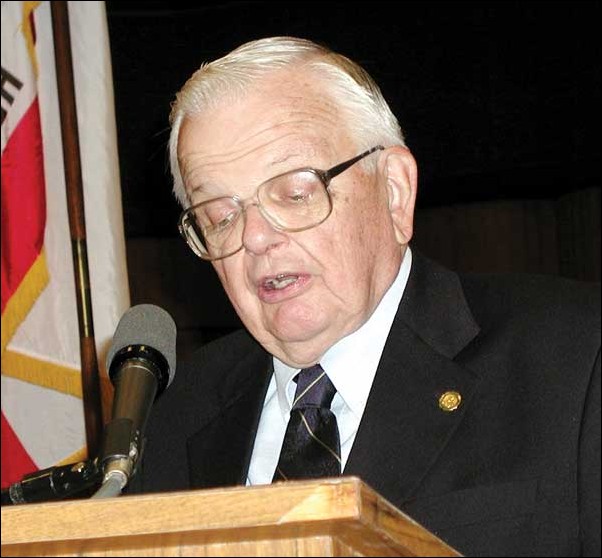Gerth and Co. stack cash
Image: Gerth and Co. stack cash:President Donald Gerth makes $235,908 annually. Gov. Davis earns $175,000.:
March 12, 2003
The highest-paid administrators on campus receive up to 39 percent more in pay compared to their annual salaries five years ago.
Student Affairs Vice President Shirley Uplinger received the highest percentage increase in pay, giving her 39 percent more annually than in 1998. This makes her one of the highest-paid administrators, with a yearly salary of $177,180.
The top five paid administrators for President Gerth are also paid $177,180 per year. The rest of them are as follows: Vice President of Administration Edward Del Biaggio, Vice President of University Affairs Robert Jones, Vice President & Chief of Staff Elizabeth Moulds and Faculty and Staff Affairs Dean David Wagner.
President Gerth makes $235,908 annually and is allotted different benefits such as a $28,752 budget for housing. Gov. Gray Davis nets $165,000 annually with extra benefits, as well. Davis grosses $175,000, but gives $10,000 back to the state.
“Faculty pay increases are not even remotely comparable to the pay raises we saw for some of the administrators,” said California Faculty Association President James Chopyak.
The highest-paid professors receive $101,712 per year. The higher-paid instructors are 12-month instructional faculty.
“They (faculty and administrators? salaries) are not comparable at all,” Wagner said. “They are different jobs.”
The ways faculty and administrators receive pay increases differ. The governor allots a compensation pot every year and a block percentage is given for employees at Sacramento State.
Administrators are eligible for pay raises solely based on merit, but faculty has three ways of receiving increases.
There is a general salary increase that faculty receives. A service salary adjustment is given based on a step program, and as long as the instructor hasn?t topped out, they are eligible. The last way to get a raise is based on merit and exceptional performance. Along with other criteria, this determines eligibility.
A service salary adjustment of 2.5 percent is given regardless of government funding because of negotiating agreements, Wagner said. This is because a union represents the faculty.
When senior faculty members retire, assistant professors who make half as much are hired, Chopyak said. The savings is where the money for raises comes from.
This is a “mythical savings” because it really does not cover the cost of increasing salaries for instructors, Wagner said.
Just finding a replacement can cost from $5,000 to $10,000. Money is often given to new instructors for things like summer stipends or moving expenses.
Most retired faculty work part-time while they are retired in the Faculty Early Retirement Program, Wagner said. FERP pays the equivalent of an assistant professor salary and after the hiring of new instructors, there isn?t any leftover money.
Chopyak said there needs to be an “openness in the budget process.” As an organization, CFA wants to know what is going on with it.
Del Biaggio is working on a set of financial documents to send to the CFA. Wagner said the CFA asked for documents and they are following through.
“We?ve tried to meet with him (Gerth), but he?s really not shown any interest,” Chopyak said. “Maybe it?s because he?s retiring and he really doesn?t see the point.”
There are Council for University Planning meetings scheduled every other Friday that are open to the public.
President Don Gerth recommended attending a CUP meeting to find out more about the budget. He said his perspective on the complaint about “openness in the budget” is different than Chopyak?s.
Not only is the CFA concerned with their salaries, they are concerned with student fee increases as well, Chopyak said.
“Before you raise student fees you have to justify it first,” he said.
Administrators? salaries and student fee increases are unrelated.
“First thing we have to remember is those salaries were there before student fee increases were occurring,” Wagner said.
Most administrators would agree that faculty should be paid more. This should not be an “us against them” issue, Wagner said.
Administrators get paid for working 12 months from 8 a.m. to 6 or 7 p.m. every day, Wagner said.
“Many of those individuals have a huge number of experience in the jobs they are in,” Wagner said.
Professors are paid for eight or nine months of work. Wagner said they also have opportunities to earn more money by teaching summer school, consulting and receiving grants.
Wagner said it is hard to compare what a profession is worth socially to what its economic value is.
“It becomes a very deep well to draw the water from,” Wagner said.
The public gets very passionate about teachers? salaries, Wagner said.
“Obviously teaching is a tremendous social value,” Wagner said.
The president defends administrators? raises due to their increasing responsibilities. “I tend to give more assignments to people rather than hiring more people,” Gerth said.
Gerth?s statistics on funding for instruction and CFA?s differed. He said more than 60 percent went toward it and not just the 45 percent that Chopyak said was spent.
“I don?t know how he (Chopyak) did his analysis,” Gerth said. Gerth declined comment on the discretion because of this.
“Clearly now we have to focus on the future,” Chopyak said.
















































































































































